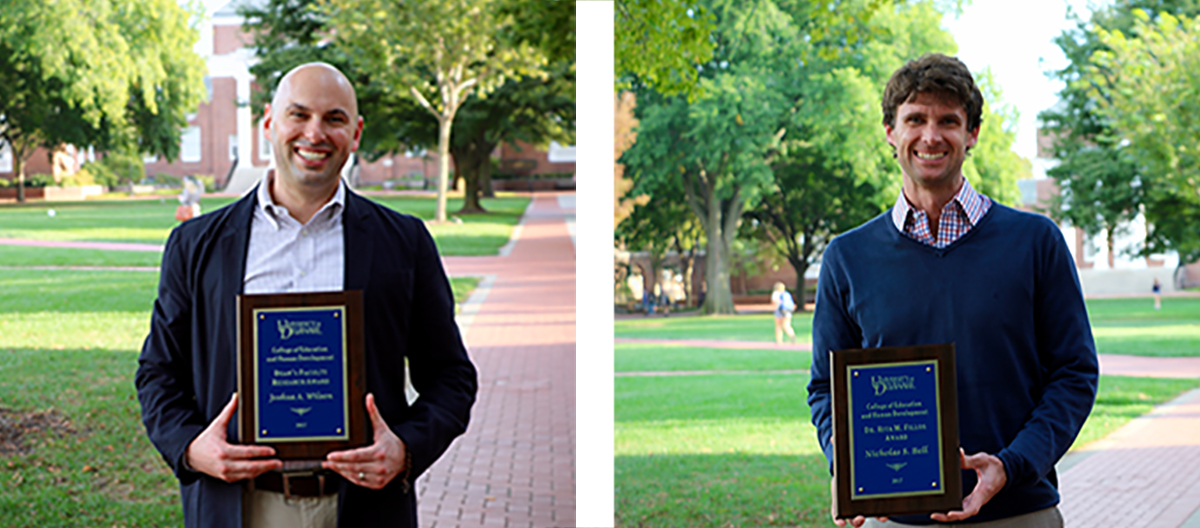CEHD recognizes excellence

On October 6, 2017, Carol Vukelich, dean, College of Education and Human Development, presented three awards during CEHD’s fall All College Meeting: Dr. Rita M. Fillos Award, CEHD Excellence in Teaching Award and the Dean’s Research Award.
Rita Fillos Award
Dr. Rita Fillos first came to UD as a secretary, and during her employment, completed a PhD in Education, advancing to become the founding Director of the Center for Educational Leadership and Evaluation, now known as CRESP. The Dr. Rita M. Fillos Award was established to recognize a CEHD staff member who is pursuing professional development opportunities while making significant contributions to the college.
This year’s Fillos Award recipient is Nicholas Bell. Nick exemplifies the vision set forth by Dr. Fillos. He entered the Education Leadership program in the Fall of 2014, but transferred into the Ph.D. in Education program in this semester.
He has proved to be an outstanding graduate student, professional, and member of the University of Delaware community. He has demonstrated exceptional performance in his courses and sought to further his expertise around issues of research methods, social justice, and teacher development and preparation.
As a CEHD staff member, Nick has proven to be an excellent clinical coordinator for ETE. He has developed strong partnerships with the schools to provide the best learning experiences for candidates. He often takes leadership for activities such as maintaining and improving resources for adjuncts, clinical educators, and students; and working with colleagues to redesign the special education student teaching experience.
Excellence in Teaching award
The CEHD Excellence in Teaching Award was presented to Bill Lewis Associate Professor in the School of Education.
Student evaluations describe Professor Lewis as “outstanding,” “knowledgeable,” “enthusiastic,” and “engaging.” They state he is easily one of the best professors they have had in their program in regards to: the quality of materials, his experience and expertise, his kindness, responsiveness to students, and his passion for teaching.
His syllabi include clear expectations, rigorous standards, meaningful uses of technology, and opportunities to apply theory to practice through events such as the Festival of Words conference. His assignments are thoughtful, with real-world application, allowing students to take what they learn back in their field.
Professor Lewis works closely with faculty across a range of disciplines ranging from agriculture, to health sciences, history and mathematics, instilling critical reading, writing and thinking into the curriculum and ensuring the materials are responsive to students’ differential needs and experiences.
An innovator, Professor Lewis has revised coursework so that it could be offered to students online in M.Ed. in Teacher Leadership and the Alternative Routes for Teacher Certification (ARTC) programs. He has led several study abroad programs, exposing students to new cultures, while creating meaningful academic experiences for them in local schools.
In addition to his teaching responsibilities, Professor Lewis has served on a number of committees for both undergraduate and graduate students, mentored undergraduates, served on six Doctoral Committees and presented at national literacy conferences.
Dean’s Research Award
The Dean’s Research Award recognizes an assistant or associate professor who has developed a strong program of research and received external funding to support that research.
Over the past three years, Joshua Wilson, assistant professor in the School of Education, has garnered national attention for his research incorporating computer software in the classroom designed to evaluate and improve student writing. His research is unique in that its aim is to deliver formative evaluations—assessments that reveal underlying gaps in student knowledge and areas for improvement rather than only indicating the success or failure of the students’ writing.
He has spent several years examining and incorporating the use of Project Essay Grade—known as PEG. His initial research has shown that students’ quality of writing improves in response to PEG’s automated feedback, and it appears to be equally effective for students with different reading and writing skills.
This summer, Josh and Skip MacArthur, professor in the SOE, received a $400,000 IES grant to study the effect of this automated essay-scoring software on the writing of 2,880 students in grades 3-5 in the Red Clay School District.
This fall, Josh also received a two-year research grant from the Spencer Foundation in support of his work to develop new writing evaluation algorithms to expand the system’s feedback capabilities.
He has published in academic journals, presented at AERA, Literacy Research Association and the International Society for Advancement of Writing Research, teaches Special Education Instruction and Curriculum at UD.



